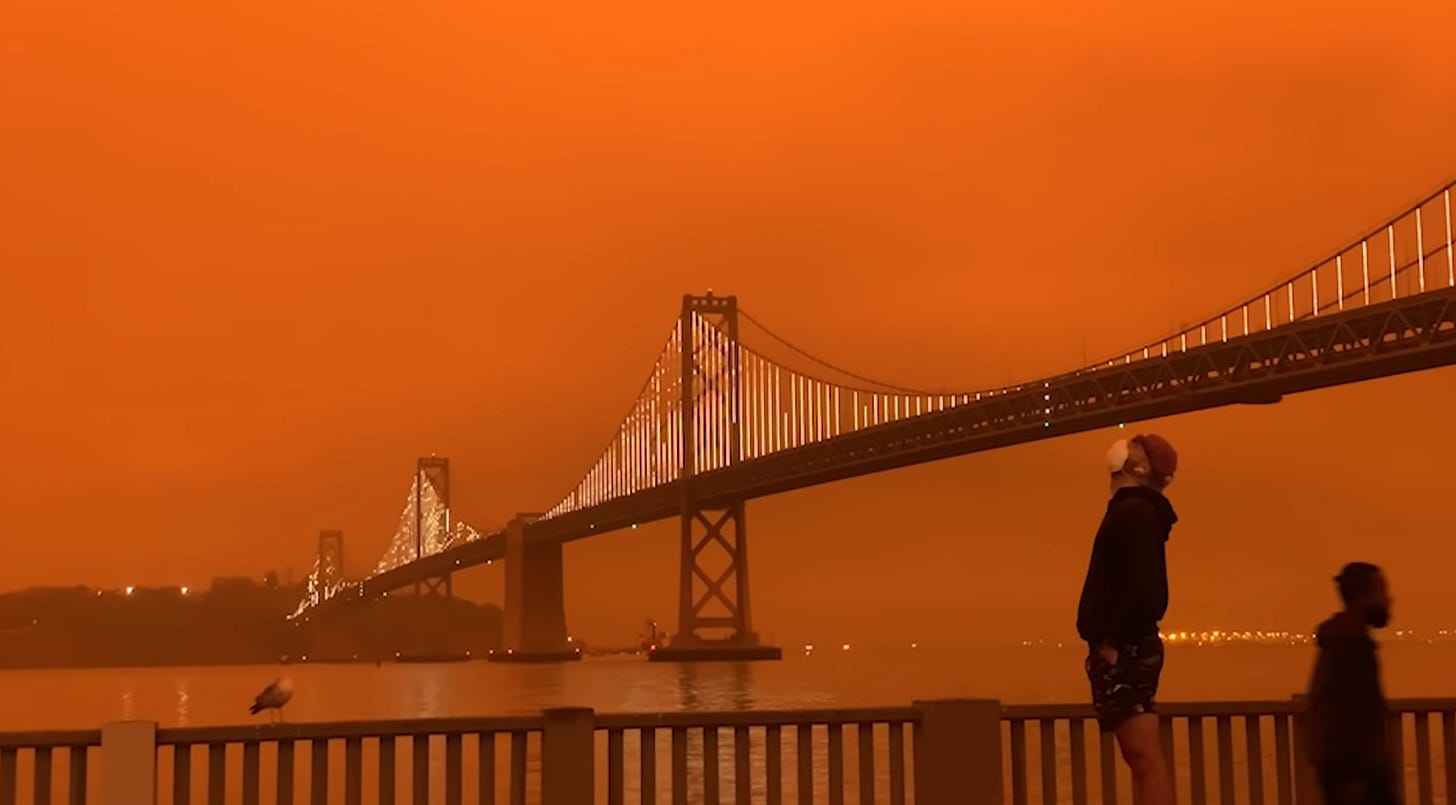This Is Just How Things Are Now
Year after year, part of the world burns down, and that is how it goes.

When I was growing up in San Francisco, everyone used to talk about “the big one” — the mega-earthquake that would, one day, wreak havoc and destruction in an echo of 1906. It was, and still is, seen as an inevitability — one day, without warning, this monster would roar through the city and you just hoped things wouldn’t be too bad when it happened.
I mention this because, as dangerous as earthquakes surely are, their exalted status on the hierarchy of threats now seems almost quaint given what is going on in San Francisco and California more generally. The real threat, it turns out, is in the air we breathe, and, most of all, in the way we look after the natural universe.
It makes sense in retrospect. Earthquakes spring almost mystically from the planet’s core, without rhyme or reason, an ancient force reaching through time to throttle us. Humans are far too impatient to wait around for something like that. We have decided that we can threaten ourselves far more efficiently than some old piece of rock can, and so we have set about systematically destroying our world. We are our own best antagonists. Really, we are little more than a mass suicide cult.
Now the sky in San Francisco is on fire, and the air has been so choked that it hurts to go outside for too long. And, as Jack Crosbie wrote last week, people in San Francisco are the lucky ones.
The scariest thing to me is the feeling that this is just how things are now. Year after year, part of the world burns down, and that is how it goes. Humanity’s capacity for self-destruction is possibly matched only by our capacity for adaptation and complacency. The first time I can remember speaking to someone on the phone through a mask was when I talked to my brother a few years ago during a bad wildfire season. I suddenly asked him why he sounded so strange. It all felt very alien. Now I am so used to masks that I barely think about them. Oh well.
You wonder what the breaking point will be when it comes to this stuff. What will climate change have to do to us — what will we have to do to ourselves and to the planet — before it hits us that this should not be the way things are? I don’t mean that in the theoretical sense; it is quite easy to sit around and know that things are fucked up. I mean it in the sense of actually making us do something about it.
It’s a daunting thought because it’s clear that capitalism and the planet can’t really survive side by side — that humanity can’t save itself if rich countries get to stay the way they are — and that is a tall order. Even if you long for this kind of revolution, revolutions are a lot, and there’s always the possibility that people decide to “do something about it” by choosing to make things worse — by embracing fascism, and leaning into the apocalypse.
I have been thinking a lot recently about the “Daisy” ad from Lyndon Johnson’s 1964 presidential campaign — you know, the one with the little girl and the nuclear bomb. (Why is an ad about the end of the world ringing around in my head these days? Gee, I wonder.)
As the bomb explodes, we hear Johnson’s voice saying, “These are the stakes. To make a world in which all of God's children can live, or to go into the dark. We must either love each other, or we must die.”
It’s despicable stuff coming from someone who had lied his way into the Vietnam War mere weeks before the ad came out, but still, the words resonate, especially the last line, cribbed from Auden. That is exactly where we are right now with the planet we inhabit — with our future in general. In my more optimistic moments, I like to think that we will look at death and walk the other way. But mostly I think we won’t.





Everything's fine. Some people are making a shit-ton of money off climate-changing industries, and one day that money will trickle down to the rest of us. We can then use that money to pay for our lung meds and breathing apparatuses.
I think about this question of doom a lot, because we decided to have a baby last year. The world we forced upon her seems untenable and perhaps unlivable. I don’t regret having her but I do think she’ll have an axe to grind with me for the rest of her life, just for being forced to live in a dying world.